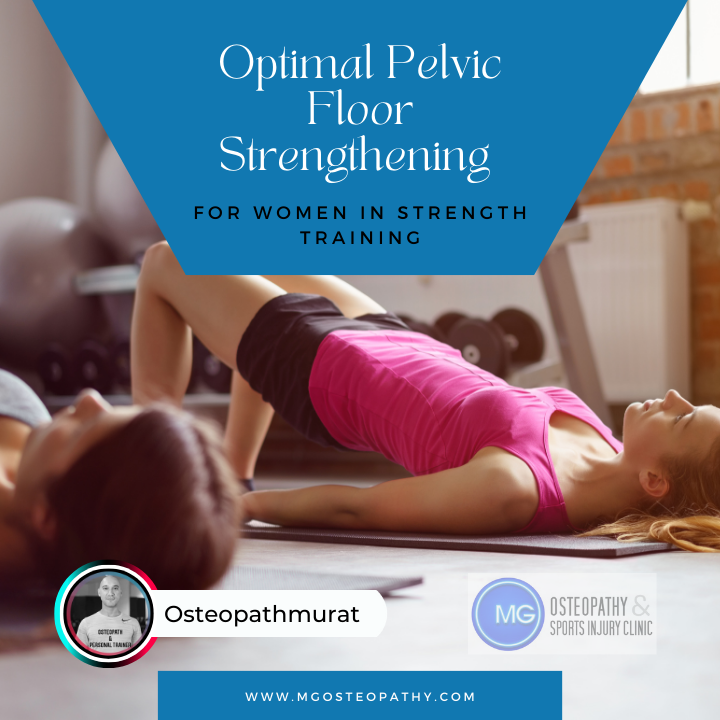In our Journey to optimal health and wellness, the integration of Osteopathy and Strength Training has proven to be a powerful combination. Last week, we explored how these two disciplines complement each other, offering a holistic approach to improving muscle function, joint mobility, and overall fitness. Building on that foundation, we will delve deeper into a crucial aspect of Strength Training that is often overlooked but holds immense significance for women: pelvic floor strengthening.
Understanding the Pelvic Floor
The pelvic floor is a group of muscles that stretch like a hammock from the pubic bone to the tailbone. This intricate network provides support to the pelvic organs, including the bladder, uterus, and rectum. Beyond its structural role, a strong pelvic floor is essential for maintaining continence, supporting core stability, and enhancing sexual function.
Significance in Strength Training
Incorporating pelvic floor exercises into a strength training regimen offers numerous benefits. These exercises not only help prevent pelvic floor disorders such as urinary incontinence but also improve overall core strength and stability. A well-functioning pelvic floor is crucial for transmitting forces effectively through the body during exercises like squats, deadlifts, and overhead presses, thereby reducing the risk of injury and enhancing performance.
Integration with Osteopathy
At MG Osteopathy, we emphasise a comprehensive approach to women’s health and fitness. Our Osteopathic treatments are designed to optimize pelvic alignment, reduce muscular tension, and improve circulation, all of which contribute to pelvic floor health. By addressing any imbalances or dysfunctions through Osteopathic techniques, we create a solid foundation upon which strength training can build.
Training Considerations for Women
Women face unique challenges related to pelvic floor health, particularly during pregnancy and after childbirth. The strain of carrying a baby and the demands of labour can weaken pelvic floor muscles, leading to issues such as prolapse or incontinence. For postpartum women, targeted pelvic floor exercises are essential for rehabilitation and recovery.
Signs of a Weak Pelvic Floor
Signs of weakness include urinary incontinence, pelvic organ prolapse, and discomfort during intercourse. Strengthening these muscles not only enhances core stability but also supports overall fitness and postpartum recovery.
Birth and Beyond
Following childbirth, it’s crucial to gradually reintroduce Strength Training exercises that focus on rebuilding core strength and supporting pelvic floor recovery. Our specialised Osteopathic care can assist in this process by addressing any lingering issues from pregnancy and birth trauma, ensuring a safe and effective return to fitness.
Empowering Women Through Education
At MG Osteopathy, we believe in empowering our clients through education and personalized care. By raising awareness about the importance of pelvic floor health and integrating this knowledge into strength training routines, we aim to foster long-term wellness and resilience in women of all ages and fitness levels.
Conclusion
Pelvic floor strengthening is not just an adjunct to strength training; it’s a fundamental component that enhances performance, prevents injuries, and promotes overall well-being. By combining the expertise of Osteopathy with targeted strength training techniques, we can optimise pelvic floor function and support women in achieving their fitness goals safely and effectively.
At MG Osteopathy, we are committed to guiding you on your journey towards a stronger, healthier you. Contact us today to learn more about how we can help you integrate pelvic floor strengthening into your personalized wellness plan. Together, let’s unlock your true strength and vitality!
Click here to find out the 12 benefits of Strength Training





